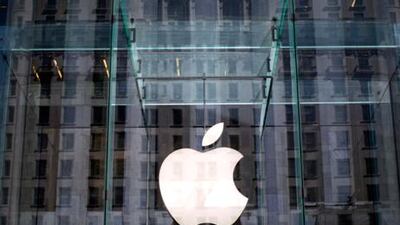SAN FRANCISCO // Apple reported last night that its quarterly profit dipped for the first time in nearly a decade as it squeezed less money from its champions in the competitive smartphone and tablet markets.
The maker of iPhones, iPads, iPods, and Macintosh computers swiftly stepped in to bolster its stock price by announcing a plan to more than double to $100 billion the amount it will spend to buy back its stock and pay out dividends.
Apple raised a coming stock dividend by 15 per cent to $3.05 per common.
"We are very fortunate to be in a position to more than double the size of the capital return program we announced last year," said Apple chief executive Tim Cook.
While Apple coffers bulged with $144.7 billion, the company said most of that money is offshore and it will be shrewder to borrow cash to implement the stock buy-back plan.
"We will fund the capital return program from operations and borrowing," said Peter Oppenheimer, Apple's chief financial officer.
Apple shares jumped briefly on the news in after-hours trades but slid back down to $405.12, about a dollar below where it was at the close of the Nasdaq.
The California-based company posted a profit of $9.5 billion on revenue of $43.6 billion in the first three months of this year, compared to a profit of $11.6 billion on $39.2 billion in the same quarter in 2012.
It said its gross margin, or the amount of money it makes in profit from its devices, shrank to 37.5 percent from 47.5 percent.
The number of iPhones sold in the quarter rose to 37.4 million from 35.1 million during the same quarter last year.
The number of iPads sold surged to 19.5 million from 11.8 million a year earlier, the earnings figures showed.
Meanwhile, sales of iPod MP3 players dropped by more than a million to 5.6 million and Macintosh computers sales slipped about two percent to just below four million, according to Oppenheimer.
The Apple board raised the overall stock repurchase limit to $60 billion from $10 billion.
Cook said that the decline in Apple stock in recent quarters has been "very frustrating for all of us."
Shares in Apple are well below their 52-week peak above $700 in September as the tech giant faces tougher competition from South Korea's Samsung and others in the busy smartphone and tablet technology sector.
"Although we've achieved incredible results, we acknowledge our growth rate has slowed," Cook said during an earnings call with financial analysts.
"We will continue to focus on the long term and we remain very optimistic about our future."
Cook remained adamant that Apple was well-positioned in the booming smartphone and tablet markets.
"This is the same company that brought you the iPhone and the iPad, and we have a lot more innovations in the works," Cook said.
He said the company had "some really great stuff coming in the fall and across all of 2014."
Revenue in Greater China was up 11 percent to $8.8 billion, with iPad sales more than doubling despite Apple reporting that growth had slowed there.
China served as an example of an Apple strategy to win over smartphone buyers with affordable prices on iPhone and iPad models, letting margins shrink in order to build ranks of loyal customers.
"China has an unusually large number of potential first-time smartphone buyers and that is not lost on us," Cook said.
He cited data showing that Apple ranks impressively when it comes to customer loyalty and the willingness of users of its gadgets to spend money on digital songs, music and apps at the iTunes store.
"Market share is important, but these other things, for us, are extremely important," Cook said. "We do want to grow faster, but we don't look at it as the only measure of our health."
The iTunes shop pulled in more than four billion dollars in revenue in the first three months of the year, setting a new record, according to Oppenheimer.
gc/jk

